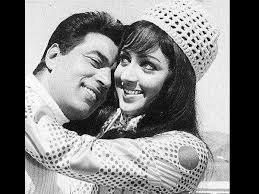.Every Indian who's sighed over Sharmila Tagore's dimples, drowned in that Kashmir ki Kali smile, seduced by her bikini babe image of An Evening In Paris, and then cried with her in Amar Prem and Mausam.
She's still as charming as ever, the mother of current heartthrob Saif Ali Khan and Soha Ali Khan. The mother of two actors and a designer is also a grandmother of Saif and Kareena's son Taimur.
She was born on 8th December 1944 in Kanpur. She is distantly related to the Nobel laureate Rabindranath Tagore.She began her career as an actress in Satyajit Ray's 1959 Bengali film Apur Sansar (The World of Apu), as the ill-fated bride of the title character. She made her debut in Hindi films with Shakti Samanta's Kashmir Ki Kali in 1964. Samanta later cast her in many more films, including An Evening in Paris (1967), in which she became the first Indian actress to appear in a bikini and with Rajesh Khanna for movies such as Aradhana (1969) and Amar Prem (1972). Other directors paired them together in Safar (1970), Daag (1973), and Maalik (1972). The pair of Khanna-Sharmila gave 7 box office hits – Aradhana, Safar, Amar Prem, Chhoti Bahu, Daag, "Raja Rani" and Avishkaar.
She starred in Gulzar's 1975 film, Mausam and won the National Film Award for Best Actress. She also played a supporting role in Mira Nair's 1991 film Mississippi Masala. She was the highest paid Bollywood actress from 1970 to 1976 along with Mumtaz. She had a very successful pairing opposite Dharmendra, along with whom she starred in seven movies - Devar (1966), Anupama (1966), Mere Hamdam Mere Dost (1968), Satyakam (1969), Yakeen (1969), Chupke Chupke (1975), Ek Mahal Ho Sapno Ka (1975) and Sunny(1984). Her filmography also includes Faraar (1975) opposite Amitabh Bachchan; Mausam (1975) and Besharam (1978) opposite Sanjeev Kumar; and Bengalifilm Mangaldeep (1991) opposite Naseeruddin Shah. In 2017.
Sharmila Tagore married Mansoor Ali Khan Pataudi, the Nawab of Pataudi and former captain of the Indian cricket team, in a Nikah ceremony held on 27 December 1969. She converted to Islam upon marriage and changed her name to Begum Ayesha Sultana Khan. They had three children: Saif Ali Khan (b. 1970), a Bollywood actor, Saba Ali Khan (b. 1976), a jewellery designer, and Soha Ali Khan
She has received two National Film Awards and two Filmfare Awards for her performances. She led the Indian Film Censor Board from October 2004 till March 2011. She was awarded Padma Bhushan by the Government of India.
Song of Kashmir Ki Kali 1964
Song of Anupama 1966
Song of An Evening in Paris 1967
Song of Talash 1969
Song of Aradhana 1969
Song of Safar 1970
Song of Mausam 1975
Song of Chupke Chupke 1975




















